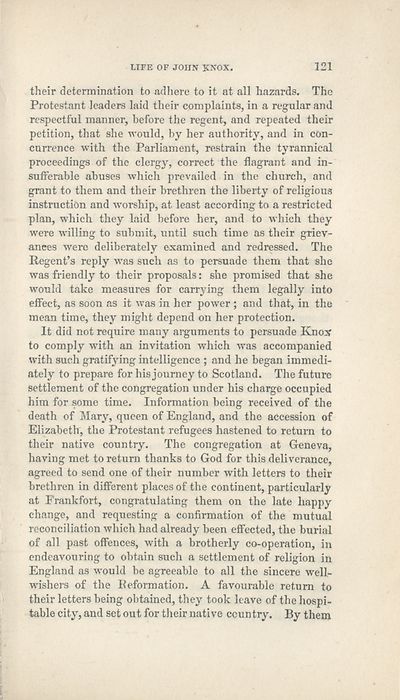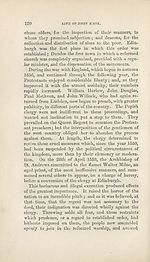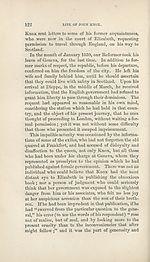Download files
Complete book:
Individual page:
Thumbnail gallery: Grid view | List view

LIFE OF JOHN KNOX.
121
their determination to adhere to it at all hazards. The
Protestant leaders laid their complaints, in a regular and
respectful manner, before the regent, and repeated their
petition, that she would, by her authority, and in con¬
currence with the Parliament, restrain the tyrannical
proceedings of the clergy, correct the flagrant and in¬
sufferable abuses which prevailed in the church, and
grant to them and their brethren the liberty of religious
instruction and worship, at least according to a restricted
plan, which they laid before her, and to which they
were willing to submit, until such time as their griev¬
ances were deliberately examined and redressed. The
Regent’s reply was such as to persuade them that she
was friendly to their proposals: she promised that she
would take measures for carrying them legally into
effect, as soon as it was in her power ; and that, in the
mean time, they might depend on her protection.
It did not require many arguments to persuade Knox
to comply with an invitation which was accompanied
with such gratifying intelligence ; and he began immedi¬
ately to prepare for his journey to Scotland. The future
settlement of the congregation under his charge occupied
him for some time. Information being received of the
death of Mary, queen of England, and the accession of
Elizabeth, the Protestant refugees hastened to return to
their native country. The congregation at Geneva,
having met to return thanks to God for this deliverance,
agreed to send one of their number with letters to their
brethren in different places of the continent, particularly
at Frankfort, congratulating them on the late happy
change, and requesting a confirmation of the mutual
reconciliation which had already been effected, the burial
of all past offences, with a brotherly co-operation, in
endeavouring to obtain such a settlement of religion in
England as would be agreeable to all the sincere well-
wishers of the Reformation. A favourable return to
their letters being obtained, they took leave of the hospi¬
table city, and set out for their native country. By them
121
their determination to adhere to it at all hazards. The
Protestant leaders laid their complaints, in a regular and
respectful manner, before the regent, and repeated their
petition, that she would, by her authority, and in con¬
currence with the Parliament, restrain the tyrannical
proceedings of the clergy, correct the flagrant and in¬
sufferable abuses which prevailed in the church, and
grant to them and their brethren the liberty of religious
instruction and worship, at least according to a restricted
plan, which they laid before her, and to which they
were willing to submit, until such time as their griev¬
ances were deliberately examined and redressed. The
Regent’s reply was such as to persuade them that she
was friendly to their proposals: she promised that she
would take measures for carrying them legally into
effect, as soon as it was in her power ; and that, in the
mean time, they might depend on her protection.
It did not require many arguments to persuade Knox
to comply with an invitation which was accompanied
with such gratifying intelligence ; and he began immedi¬
ately to prepare for his journey to Scotland. The future
settlement of the congregation under his charge occupied
him for some time. Information being received of the
death of Mary, queen of England, and the accession of
Elizabeth, the Protestant refugees hastened to return to
their native country. The congregation at Geneva,
having met to return thanks to God for this deliverance,
agreed to send one of their number with letters to their
brethren in different places of the continent, particularly
at Frankfort, congratulating them on the late happy
change, and requesting a confirmation of the mutual
reconciliation which had already been effected, the burial
of all past offences, with a brotherly co-operation, in
endeavouring to obtain such a settlement of religion in
England as would be agreeable to all the sincere well-
wishers of the Reformation. A favourable return to
their letters being obtained, they took leave of the hospi¬
table city, and set out for their native country. By them
Set display mode to:
![]() Universal Viewer |
Universal Viewer | ![]() Mirador |
Large image | Transcription
Mirador |
Large image | Transcription
| Antiquarian books of Scotland > Scotland/Scots > Life of John Knox ; and, The life of Alexander Henderson > (139) |
|---|
| Permanent URL | https://digital.nls.uk/131833972 |
|---|
| Description | Thousands of printed books from the Antiquarian Books of Scotland collection which dates from 1641 to the 1980s. The collection consists of 14,800 books which were published in Scotland or have a Scottish connection, e.g. through the author, printer or owner. Subjects covered include sport, education, diseases, adventure, occupations, Jacobites, politics and religion. Among the 29 languages represented are English, Gaelic, Italian, French, Russian and Swedish. |
|---|

